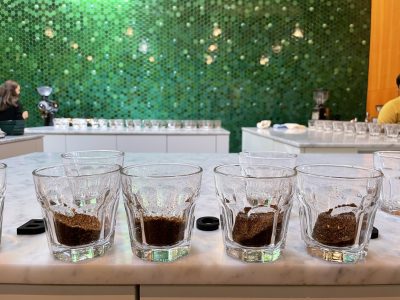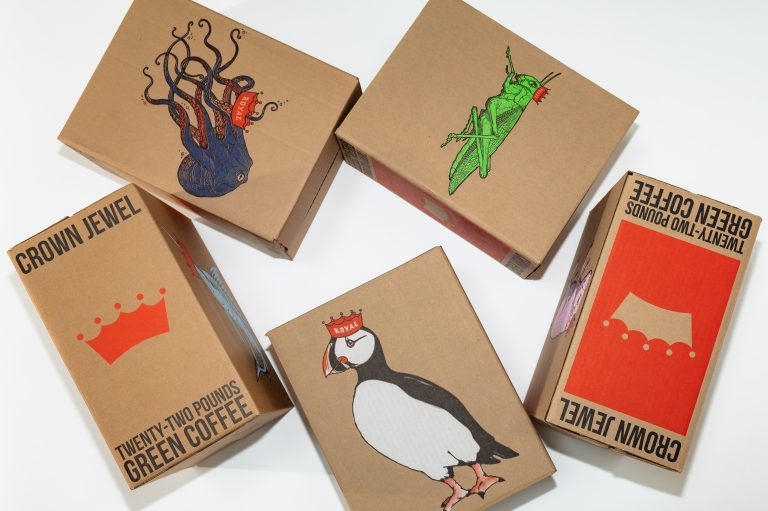Kigali, April 2023
Ernest Nshimyimana picks me up from the hotel in Kigali just an hour after I arrive. I’ve already driven three and a half hours this morning, starting on the shore of Lake Kivu in Rwanda’s western province. Now we’re heading north, and the SUV is extra in the way the kids mean it; the Lyft Lux of coffee travel. Ernest sits in the front passenger seat; he’s the managing director of Dukunde Kawa Musasa Cooperative, and despite the casual nature of our WhatsApp exchanges, he’s a man with much responsibility and authority, who has generously agreed to personally escort me to the washing stations and mill for a private tour.
Finally, after more than a decade of drinking the coffee, I get the chance to visit, and I’m thrilled. Just under thirty miles from the center of Kigali, about an hour-and-a-half on the road, we ascend a few hundred meters in elevation and arrive at the large and well-manicured facility known as Musasa Ruli.
Ernest explains the structure of the organization along the route up to the facility: Dukunde Kawa is at the size where it operates a little more like cooperative unions in places like Kenya and Ethiopia. They produce around 300MT annually and represent over a thousand farmers who contribute coffee cherry to one or more of their four washing stations, each of which possesses Fairtrade and Rainforest Alliance (RFA) certificates, but only one of which is organic: Mblima, our next destination.

Sorting Tables at Musasa Ruli
But first, the tour. Ernest escorts me up a small hill as we walk past the scenic drying beds, still active even on a Sunday, with women turning parchment and moving yellow tarps. Large murals decorate several of the buildings’ walls, and I note the detailed instructions for certification maintenance in both English and Kinyarwanda as we cross the paved road and find ourselves at the Musasa Coffee Shop.
We split a Chemex and talk shop for a bit.
“Why didn’t Royal purchase coffee in 2022?” Ernest inquires. He’s not hurt, so much as curious.
“That was mostly my fault, I think. We overcommitted to other suppliers; felt we couldn’t move enough. Also, wasn’t there a certification lapse in the organic coffee?”
“Yes that’s true, we lost it one year but it has been resolved. So what about this year?”
“Ernest, I’m here representing Royal’s commitment to return to our usual business with you and the Dukunde Kawa cooperative. I believe our values align, your coffees taste excellent, and the organic certification is important to many of our customers. I hope our off-year doesn’t affect business this year, I know it’s been a low volume season.”
“We have coffee and value the commitment, and Royal’s partnership. The only trouble is making the request early enough. Mblima is very high elevation, maybe 2200 meters, so they usually produce some of the best tasting coffee. We have a lot of customers for that station that don’t even care about the organic certificate.”
“That’s good to know.”
“The sooner the better. Sometimes requests late in the season are difficult to fill.”
“I see.”

A Mural At Musasa Ruli
There’s little that brings me more joy than telling a supply partner I’ll buy their coffee. For all of the challenging conversations about supply and support during my two weeks in Africa this year, the reinvestment in Dukunde Kawa feels like a relief, and like the right thing to do. I’ve not been the primary buyer of this coffee, that’s always been Jeri Idso for Royal. But the opportunity to visit and shake a hand, and get some first-person intel about how to make things smoother in the future is enlightening.
Now that we’re caffeinated, Ernest calls over the teenager in the corner, mindlessly strumming an electric guitar, and asks to play. He plucks at the strings for a moment, then hands it to me.
“Do you play?”
“A little, but I’m out of practice,”
I lock eyes with the young man, then pull out my phone and open my tuning app.
“May I?” I ask, already twisting the pegs.
I pray I don’t break the strings, but after a few minutes we’re in business. I try out a few notes and hand the axe back.
“Should sound a little better now.”
I can’t tell if the kid cares. Maybe he’d written a song with an impossible alternate tuning, now never to be played again.
We exit the café through the gift shop, and I purchase a few woven baskets on the way out. Ernest knows the names of the women who’ve made them by looking at the patterns. He tells me the proceeds will go directly back to them.
I follow Ernest across the way to the warehouse, its large dusty machinery mercifully silent this Sunday afternoon. The next room has a setup I’ve not seen elsewhere in East Africa. Conveyer belts, maybe half a dozen, each with ten or more stools stationed at regular intervals for hand-sorting. I imagine workers, likely mostly women, worrying over each bean as it passes their gaze; thankless work.
From the dry mill we climb another few meters to the newly constructed cupping lab where Emerithe Mukamurigo awaits, water at a boil, to cup. Emerithe’s cupping style is fluid, she’s quick but quiet at the table. We’d met at Ikawa House earlier in the week and cupped, and I thought maybe she had been shy in the company of competition. Here in her lab, however, she remains softspoken even though there’s one coffee that absolutely jumps off the table.
It’s Mblima. Emerithe smiles knowingly when I tell her my score. She already has a green sample prepared for me to take back to Oakland.

The nursery at Musasa Ruli
No sooner can I thank her then Ernest whisks me off to view their small nursery and then the coffee tree test garden where he demonstrates how to repot seedlings, and then it’s back to the wet mill, where he proudly shows off a brand new Pinhalense gravity sorter and relatively new demucilaginator – top of the line equipment from one of Brazil’s leading manufacturers. He explains the process to me. It’s quite detailed and highly intricate, and results in by far the most informative visit I’ve had to a washing station in quite some time.
After hand sorting the cherries for ripeness, they are then floated to remove sticks, stones, and floaters. The Pinhalense mechanically sorts them for density, after which they’re depulped and thereafter demucilaged, a rare second-step. Another idiosyncrasy: the coffee is then washed and channel graded before fermenting (dry) then washed in the tank and soaked in clean water, then washed and channel graded (again!). The coffee is then dried in parchment, usually for about 3-4 weeks.
Demucilaged coffee doesn’t usually need to ferment, but they do it anyway. Most washed coffee is channel graded only after fermenting. Why do they do all this extra work?
“Because it improves the flavor,” Ernest explains.
“But it’s so inefficient!”
“But it’s worth it!”

Fermentation Tanks at Musasa Ruli
It’s exactly what I want to hear, but exactly what I cannot ask for. The coop have decided this is the best way to do what they do. The cup doesn’t lie, and their hard-working members reap the benefits of the extra steps with quality premiums and other services the coop provides.
One of those services is the next stop on my tour – the dairy processing facility. Milk and coffee have always been close, but maybe never quite this close. It turns out that after a few years of a successful program which matched farmers with dairy cattle, the cooperative suddenly had more milk than anyone knew what to do with. So they started selling it to local markets. Then came the yogurt. Then the cheese. With this growth pattern, Dukunde is well on its way to eclipse coffee sales with dairy in the coming years!
The building next door houses a newly installed coffee roaster, used to sell finished coffee to the Rwandan market as well. I love to see it. Rwandan grown coffee, celebrated for quality, stays in-country to be enjoyed in some cases by the very souls responsible for its cultivation and care.
As I reflect on this, Ernest checks his watch. We have to leave to meet the station manager at Mblima, the organic certificate-carrying washing station. It’s two and a half miles up the road and another 200 meters above our already dizzying 1930masl at Musasa Ruli. It takes about thirty minutes on the winding dirt roads in our oversized SUV. If not for the elevation, we probably could’ve walked it faster. We’re by far the least subtle vehicle on the road – tinted windows and sunglasses, and the obvious, somewhat oblivious coffee buyer in the back seat.
Mblima is small and the station manager gracious and softspoken. They’ve recently replaced their diesel generator with an electric motor – even here at over 2100 meters, thirty minutes from the closest village, and almost two hours from Kigali, they’re on the grid.
The visit is brief but Ernest informs the station manager that I’ve already committed to buy. That I represent a big buyer. It puts an awkward weight on the conversation. We pose in front of a sign indicating the organic status but I hate the photos. I shake his hand, thank him for his time and the work he does to nurture some of the county’s finest coffee.

The station manager at Mblima
And we’re off, back to Kigali, back to the city, off to bed, up at dawn for the next flight.
Dukunde Kawa is Kinyarwanda for “We Love Coffee.” It’s as cheesy as it gets, nearly cringe-inducing. But also as genuine as it gets. This coop has survived where others have faltered in no small part thanks to the colossal efforts of folks whose lives depend on the stuff, and whose ability to thrive, and not just survive, depends on a special kind of care for the earth, the people, and of course, the coffee.
Royal booked three lovely lots of coffee this season, including large quantities from both Musasa Ruli and Mblima. If you’d like to commit to a few bags before they land, don’t hesitate to reach out to your trader.


